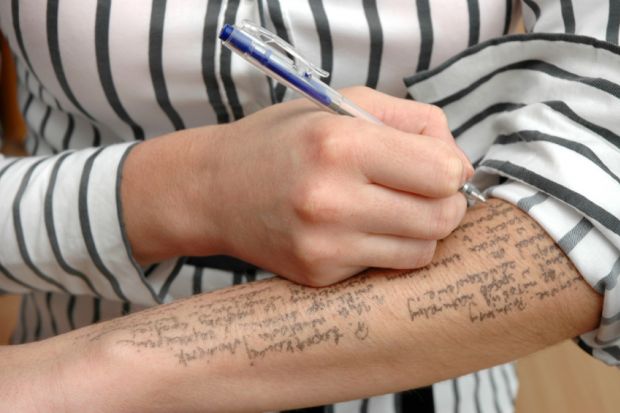Working as registry officer, I spend much of my time setting up assessment offence hearings. In other words, when students are caught cheating, I gather evidence, notify all who need to be involved, and set up hearings where panel members determine if an offence has been committed and what the penalty, if any, should be applied.
I know what you’re thinking, I should get a pay-rise.
After all, I am operating in the midst of the “epidemic” where cheating is rife and destroying academic as we speak. The recent investigation by The Times stating that 50,000 students have been caught cheating over the past three years has led to a raft of reports using words like “crisis” to describe the state of affairs.
I’m sorry to burst bubbles (and my case for a pay-rise), but it’s really not that dramatic.
Anyone directly working in this field knows that each university has a unique student profile, and its own processes for dealing with academic misconduct. Speaking in such general terms is meaningless - and unfair on students.
The claim that because only 1 per cent of caught cheaters are kicked out, universities aren’t taking cheating seriously is baseless too. There are a range of penalties that can and are imposed on students that are caught.
But cheating is worth talking about, because it teaches us a great deal about pedagogy, communication and support.
Academic misconduct is not just about students looking for an easy pass. In examination offences, we often learn that students simply lack confidence. I have seen students conceal notes in exams that couldn't even be applied correctly without a thorough knowledge of the topic. Essentially, the notes themselves were pointless.
Sheer desperation and distress is not uncommon either. This is particularly the case for students who have been through an extenuating circumstance, and find themselves on a final exam attempt. Not knowing what else to do, or where to go for last-minute additional help, they simply try to cheat.
This is where support during, and in advance of, assessment periods is crucial. Students’ unions across the country often do this effectively through targeted well-being campaigns and signposting to support services.
The price of being a student is rising, and correlating is the rise of anxiety amongst students. Ruth Caleb, chair of Universities UK's mental well-being working group, said in September last year that counselling services are facing an annual rise in demand of about 10 per cent.
Read more: New student mental health guidance for universities launched
It has also been said that the numbers of students using bespoke essay writing services is on the rise. One consequence of education being marketed and sold as a product is that there will be those selling supplements. These services are easily accessible and often take advantage of by students who have failed to access the right support.
Not so long ago, during my time as a student officer, I saw promoters of these essay-writing services attempting to reach out to students. When we saw it on social networks, we called them out by exclaiming our students were smarter than that.
I would love nothing more to see a university publicly take on these essay mills and empower their students at the same time. But the reality is, institutions won't do that for fear that in doing so they'll be thought of as "having a problem".
One of the statistics quick to hit the headlines following the Times investigation was that foreign students are four times more likely to cheat.
Less well publicised are the reasons why that may be the case. Is it that international students lose their moral compasses on their journey to the UK? Or perhaps the places from which they came are morally inept? Well, that’s what the xenophobes want you to believe, and they will quote this statistic with no sense of understanding.
Read more: Overseas students’ language skills queried
Plagiarism and referencing may be new concepts to international students. And they’re certainly not easy to get your head around, especially if English is a second language. One person’s plagiarism is may be another’s sharing of expert knowledge. There is a balance that needs to be struck between application of the source and quotation. These cases are indicative that the way in which we communicate the message of citation towards international students need to be improved.
The hardest part of my role is finding academics to be panel members. Academic misconduct is a difficult topic. However, when a new panel member attends a hearing, they often after tell me how they’ve learnt and developed their own understanding of the way in which students behave.
We must be free to have that conversation. Free from the fear of context-less statistics which only give rise to xenophobia and the unwarranted shaming of universities. Cheating must not become another metric to pit universities against one another.
Instead, let’s talk about how cheating students teach us that our communication needs to be improved and that our pastoral support systems need to be robust.
Rima Amin is registry officer at Birkbeck, University of London and a freelance writer.




